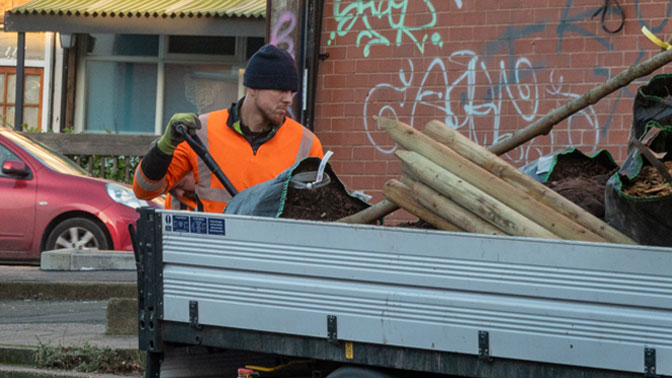
Figures released by the Health and Safety Executive (HSE) on 3 July 2024 revealed that 138 people were killed at work in 2023/24. That’s the up from 136 deaths the previous year, and marks a rise for the third consecutive year.
The number who are suffering from work-related ill-health has topped off at a never higher 1.8 million.
This is a problem going unseen and unpoliced. HSE’s ‘all inspectors’ count fell from 1,651 in 2010 to 974 in 2023, mirroring dramatic funding cuts under the Conservatives (Hazards 163).
 TOUGH TIMES Jobs became harder, more unhealthy and less secure for many workers under the Conservatives.
TOUGH TIMES Jobs became harder, more unhealthy and less secure for many workers under the Conservatives.
And the Tory ‘minimum service levels’ anti-strike legislation, which led to an alarmed International Labour Organisation (ILO) expressing “serious concerns” about breaches of the UK’s international obligations, limits the ability of unions and their members to challenge work in potentially harmful or life-threatening environments.
Something has to change.
In 2019, the Hazards Campaign produced Decent jobs and decent lives: A manifesto for a health and safety system fit for workers.
PROMISING Labour’s landslide victory in the 4 July 2024 general election and its promise in the 17 July King’s Speech of early action to improve employment rights has been welcomed by unions. More
This provided a blueprint for reviewing and reorganising our occupational health and safety enforcement authorities and reestablishing the principles of a preventive health and safety system with workers’ health as its priority.
Since then, we have experienced the Covid-19 pandemic – a catastrophic event which has laid bare the failings inherent in the current occupational health and safety regulatory system, with its inadequate inspector numbers, decades of financial cuts and political capitulation – on top of growing deprivation that contributes to poor worker health.
This is why we have updated and strengthened the demands in a revised edition.
Here is our refreshed 13-point plan for the new government.
1 Develop an occupational health and safety system based on prevention, precaution and participation.
2 End the deregulation agenda and restore effective occupational health and safety regulation and enforcement as a social good.
3 Provide real, enforceable employment and safety rights to ensure good health and safety, especially in low paid precarious work, with adequately funded and staffed enforcement agencies working together. All workers, including subcontracted and gig workers, must be covered by occupational health and safety regulations.
4 Health and safety research, regulation and enforcement must address the disparity caused by failing to recognise the effects of work on women, including reproductive hazards. All risks must be sex and gender assessed, and where PPE is required, it must be designed and fit for the person and the work activity.
5 The HSE must be funded adequately to enable it to: Employ sufficient occupational health and safety inspector numbers and maintain independence of politicians and industry; be centred on tripartism; and be able to enforce all the health and regulations, including the Safety Representatives and Safety Committees Regulations 1977 (See Safety committed). It must develop a working relationship with safety representatives to ensure that all reported concerns from trade union safety reps are addressed effectively within a reasonable timeframe. The HSE must reinstate its direct phone lines and create a whistleblower helpline. Local authorities' occupational health and safety enforcement must also be adequately resourced to ensure they can fulfil their legal duties.
6 The HSE board must ensure a true tripartite representation, with sector-based trade union, employer and HSE representatives. The key principles of the HSE must be respected: To preserve life, prevent ill-health and injury and ensure workers, community and the environment are not placed at risk by business interests.
7 The HSE must ensure all work-related incidents are reported; all major incidents, major injuries and serious occupational diseases are investigated; and where necessary prosecutions follow. Work-related suicides must be RIDDOR reportable. The time taken to investigate and prosecute incidents, especially work deaths, must be shortened. There must also be positive directors’ duties – holding those ultimately responsible to account (See: Deadly oversight).
8 The rules covering the Industrial Injuries Advisory Council (IIAC) – the body which decides which conditions qualify for state industrial disease payments – must be reviewed. This is to ensure Great Britain recognises the global listings of occupational diseases that exist and rapidly develops mechanisms to operationalise them for reasons of social justice, to reduce their occurrence at work and to secure economic and social benefits, including savings on NHS treatment costs.
9 There must be an independent occupational health service, as part of the NHS, to provide support and advice to all workers and employers. GPs must record occupation at every consultation. We need an occupational health service which is prevention and rehabilitation focused.
10 Covid-19 and other airborne diseases must be identified, assessed and controlled in all workplace infection control procedures, which includes establishing adequate ventilation/air filtration systems, and other mitigations, including PPE. Covid-19 should be recognised as an occupational disease.
11 A strengthened, properly resourced and staffed UK REACH must also include oversight of the REACH decisions, by a body which includes trade union representatives, representatives from environmental justice groups and industry representatives. As a matter of urgency, risk controls are needed on work-related exposures to per- and polyfluoroalkyl substances (PFAS) and endocrine disrupting chemicals.
12 The functions of public health bodies must be reviewed, renewed and adequately resourced, to apply the principles of prevention, prolonging life and promoting health and wellbeing. Their important work must not in future supersede the occupational health and safety role of an effective HSE, but operate in partnership to prevent occupational spread of diseases.
13 Toxic and hazardous substances and air pollution are occupational as well as environmental health risks. All enforcement bodies must work together to identify, assess and control these risks to workers and communities. Workers must be involved in monitoring and developing control measures for indoor and outdoor air quality, where this is their working environment. This approach links with wider public health and environmental strategies because reducing workplace air pollution and other forms of pollution benefits workers, contributes to wider zero pollution policies and global targets of agencies such as the World Health Organisation (WHO) and the International Labour Organisation (ILO). A comprehensive Clean Air Act incorporating controls on indoor air pollution must be supported.
- Decent jobs and decent lives: A manifesto for a health and safety system fit for workers, Hazards Campaign, June 2024.
New Labour government, new rights at work
Labour’s landslide victory in the 4 July 2024 general election and its promise of early action to improve employment rights has been welcomed by unions.
 NEW ARRIVAL Prime minister Keir Starmer has said his government will hit the ground running. He has some way to go to restore work safety standards.
NEW ARRIVAL Prime minister Keir Starmer has said his government will hit the ground running. He has some way to go to restore work safety standards.
The new government’s manifesto commits it to quickly implement Labour’s Plan to Make Work Pay – also known as their New Deal for Working People – with the introduction of legislation in the government’s first 100 days.
The plan promises to ban zero hours contracts and end fire and rehire, as well as extend health and safety and blacklisting protections to self-employed workers.
Labour said it would give the Information Commissioner’s Office (ICO) and employment tribunals the power to seize and destroy any lists to prevent blacklisting in the future.
It also promises to close a loophole in legislation that it says allows employers to bypass laws by subcontracting and to improve access to sick pay, noting: “We will ensure the new system provides fair earnings replacement for people earning below the current rate of statutory sick pay.”
Labour says it will strengthen the collective voice of workers by giving unions better access to workplaces and by introducing a new duty on employers to inform employees of their right to join a union.
The King’s Speech on 17 July 2024 in the House of Lords outlining Labour’s plans for this session of government, said it “is committed to making work pay and will legislate to introduce a new deal for working people to ban exploitative practices and enhance employment rights [Employment Rights Bill]. It will seek to establish the appropriate legislation to place requirements on those working to develop the most powerful artificial intelligence models.”
Welcoming Labour’s plans, TUC general secretary Paul Nowak said: “After 14 years of chaos and decline working people and their families can hope again.”
He added: “The trade union movement stands ready to roll up its sleeves and help the new government deliver Labour’s New Deal for Working People, and a fairer economy for all.”
GET BETTER SOON
On 3 July 2024, the last day of the Conservative government, new official figures revealed workplace deaths have increased again. Work-related ill-health has plateaued at an all-time high. Here, Janet Newsham of the national Hazards Campaign spells out what Labour must do now to make work safer and healthier.
Hazards Campaign's refreshed 13-point plan for the new government.
| Related stories | |
| • | New Labour government, new rights at work |
| Hazards webpages | |
| • | Union effect |
